Use of the Present Subjunctive with verbs and expressions of will and influence - Page 4
OBJETIVOS
- Use the subjunctive to express will and influence
The present subjunctive with verbs or expressions of will and influence
In this unit you will learn to recognize and use the subjunctive in expressions of will and influence. You will study a group of verbs that is regularly used when someone wants to express influence or affect the behavior of another, whether a person, a thing or a situation.
Subjunctive sentences generally have two subjects, one in the main clause and one in the subordinate clause. The main and the subordinate clauses are separated by the conjunction que, which connects the two clauses.
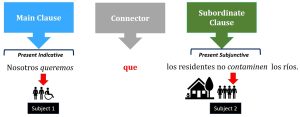
First, let’s take a closer look at the subordinate clause.
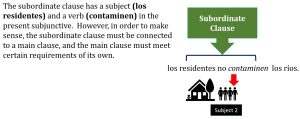
Now, let’s review the main clause.
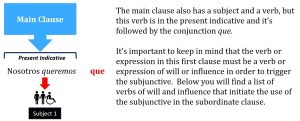
Here is a list of common verbs used to express will and influence.
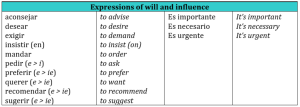
We have reviewed three distinctive rules that must be observed when using the subjunctive. In summary:

Take a look at the following two examples and review how these three rules are used.
First example:
This example shows a complex sentence, which is a sentence with two clauses connected by the conjunction que. Note that the verb in the main clause uses the present indicative to express influence, while the subordinate clause uses the present subjunctive.
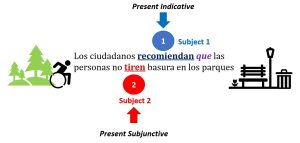

Second example:
As you review the second example, try to answer the following questions. Which is the first and which is the second subject? Which verb triggers the use of the subjective in this example? Which verb uses the indicative and which uses the subjunctive?


Using the infinitive with verbs and expressions of will and influence
You will also encounter scenarios where verbs and expressions of will are used, and there is no change of subject in the sentence. In these cases the infinitive is used because there is not a second subject being affected or influenced. Let’s take a look at the two examples below.
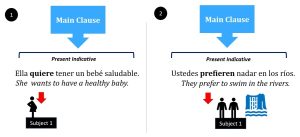
None of these examples require the present subjunctive because the subject is not attempting to exert influence on someone else, but merely expressing a want or preference that does not affect anyone; thus, there is not a second subject.
Actividad 1. Completa cada oración con la forma correcta del verbo en paréntesis. ¡Ojo! A veces tienes que usar el infinitivo.
- Los científicos ___________________ (querer) descubrir otras alternativas para prevenir la polución ambiental.
- Es urgente que los residentes de esta región __________________ (dejar) de contaminar el mar y los ríos.
- Insisto en que mi familia ___________________ (reciclar) los envases de plástico y vidrio.
- Mis amigos y yo __________________ (insistir) en proteger el hábitat de nuestro parque regional.
- Mis padres prefieren que yo ____________________ (trabajar) para una organización ecológica.
- El profesor de español sugiere que nosotros ______________________ (llevar) nuestras propias bolsas al supermercado.
- Deseo que mis compañeros _____________________ (usar) más la luz natural y menos electricidad en sus casas.

